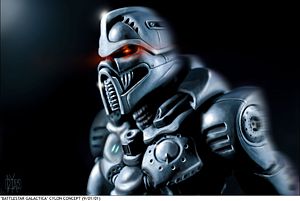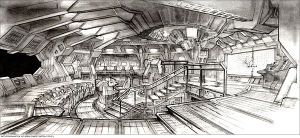Battlestar Galactica (SDS): Difference between revisions
More languages
More actions
| Line 48: | Line 48: | ||
==External links== | ==External links== | ||
* [http://www.coolscifi.com/gallery/browseimages.php?do=browseimages&c=67 Images of the Singer/DeSanto production] - includes photos of sets and vipers under construction as well as pre-production sketches and designs. | * [http://www.coolscifi.com/gallery/browseimages.php?do=browseimages&c=67 Images of the Singer/DeSanto production] - includes photos of sets and vipers under construction as well as pre-production sketches and designs. | ||
* [http://www.youtube.com/watch?v=A0E7yIl2g88&list=FLrIBODxWIieq6zwvGyKozlg&index=26 Interview - Tom DeSanto talks about his 2001 Battlestar Galactica project] | * [http://www.youtube.com/watch?v=A0E7yIl2g88&list=FLrIBODxWIieq6zwvGyKozlg&index=26 Interview - Tom DeSanto talks about his 2001 Battlestar Galactica project - YouTube] | ||
==References== | ==References== | ||
Revision as of 14:06, 10 September 2011
| |||||

An effort to create a continuation of the original Battlestar Galactica series was formulated through the Sci Fi Channel's former executive vice president, Bonnie Hammer, in June of 2000.
Director Bryan Singer and producer Tom DeSanto, who met over an air flight while Tom was watching the Original Series on DVD, began talking as well about a revival of the series around the same time. ("SDS" is Battlestar Wiki's shortcut designation, using the last initials of the revival leaders.)
By the start of 2001, the rumors increased of the likelihood of a new series. The rumors were confirmed by February of that year, and the holders to the rights for Battlestar Galactica, Studios USA, announced that Bryan Singer and his collaborative team were intent on maintaining the spirit of the Original Series. To reinforce this notion, the studio also indicated that Original Series creator Glen Larson had given an endorsement for the project, and had been brought to the development team as a creative consultant.[1]
Rise and fall
Casting, crewing, set design, and a preliminary script were readied. by April 2001, production was greenlighted by the studios. The Fox Television Network offered to host the new series pilot.
Despite the enthusiasm of holding true to the nature of the Original Series, information from various sources indicated that Original Series cast members were not being considered for the nascent series initially. After what appears to have been a generous amount of negotiation, actors Dirk Benedict and Herb Jefferson Jr. announced they would be joining the cast. Benedict indicated he would reprise his role as Starbuck.[2]
With sets in place in studios in Canada (where production costs would be less than in America) the pilot was scheduled to begin filming in November 2001. But with the events of the terrorist attacks of September 11, 2001, morale, as well as impacts and complications to scheduling and travel delayed events by over a month.[3]
The creative linchpin of the project (at least from the studio's perspective), Bryan Singer, was forced to leave the new Battlestar project as he was obligated in directing and managing pre-production of the X2: X-Men United motion picture. With his departure, the studio's confidence in completing the new series unraveled, starting with Fox Network, who withdrew their support in favor of another TV series by Buffy the Vampire Slayer and Angel creator Joss Whedon: Firefly.
An attempt was made to locate another director, but by then support for DeSanto's original concept had faded.

Further driving the remaining nails in the project's coffin was Studio USA and the Sci Fi Channel itself, which began a second revival attempt, this time tapping veteran Star Trek writer Ron D. Moore and producer David Eick to lead a totally "rebooted" or "re-imagined" version of the story that paralleled many elements of the Original Series, but contained wholly distinct and diverse casting (including no Original Series cast initially)[4], many initial plot elements borrowed directly from the failing SDS project, and a serious, character driven storyline using very few typical SF cliches. This project was officially announced in April 2002.
The sets and other physical effects built for the Singer/DeSanto project were destroyed as the project died in utero while its fraternal twin was born, airing on the Sci Fi Channel by year's end, 2003, backed up with financing by Sky One in the United Kingdom.
Singer's work continues in such movies as Superman Returns, a successful 2006 revival of the Superman movie franchise. DeSanto continues his role as producer in past and new films such as Singer's X-Men 2 and the live-action Transformers, released in July 2007.
Ron Moore's new series went on to receive technical and popular acclaim, and concluded after four seasons with a prequel series expected to begin in 2010.
The Storyline
The continuation, built from the events of the episode "The Hand of God", tracks the Fleet after Galactica and Pegasus shake off the Cylon pursuit. The opening depicts a Colonial classroom where a teacher reviews the history of the Fleet, 23 years prior. Pegasus is confirmed as lost[5], and the Cylons themselves paid a high price in the battle.
The quest for Earth continues, but Commander Adama has died, and Colonel Tigh assumes command. The citizens of the Fleet tire of spacefaring life, and, after a civil uprising, convince their leaders to settle the Fleet in an asteroid field that is rich in resources.
The new colony, named New Caprica, builds new ships, settlements and facilities from the asteroids.
The Cylons themselves reflected on their failures and determined that free will was a serious issue that caused problems in their logic-based civilization. When Baltar is found marooned, the Cylons initially held him up as a perfect example of their failures. Baltar convinced the Cylons that some qualities of humanity are useful, and underwent a cybernetic transformation into a new Cylon model to prove this. More dissent arose among the Cylons as a result, leading into a civil war. Out of the ashes of their war came a new Cylon race that, instead of obliterating the remnants of humanity that it finds, begins instead to assimilate the conquered humans as Cylon cyborgs.[6]
The character known as Boxey has grown up and assumed command of Galactica under the name of Commander Orin[7] who faces the loss of his command from political pressure to decommission the battlestar as it has become outmoded and difficult to maintain. The political pressure becomes a command. The Colonial president, a woman named Mara, visits the battlestar in her shuttlecraft to attend the battlestar's decommissioning ceremonies.[8]
Just as the battlestar's systems are powered down, the Cylons, who have studied New Caprica in secret and devised an elaborate plan for success, strike.
See Also
- Battlestar Galactica: The Second Coming, a proof-of-concept mock trailer created by Richard Hatch to boister support with Universal Studios for a series or motion picture revival of a complete original series continuation.
- The Battlestar Galactica video game, which was apparently created in anticipation of this series project. The game contains characters and situations derived in whole or in part from the Original Series, with some elements that later appear in the Re-imagined Series. The result of these derivations is a video game with a storyline in neither the Original nor the Re-imagined Series continuity.
- Battlestar Atlantis, a planned continuation by series creator Glen Larson.
External links
- Images of the Singer/DeSanto production - includes photos of sets and vipers under construction as well as pre-production sketches and designs.
- Interview - Tom DeSanto talks about his 2001 Battlestar Galactica project - YouTube
References
- ↑ Larson himself had begun a motion picture continuation project some months prior.
- ↑ Benedict later appeared in the Re-imagined Series's pre-Season 2 special "Battlestar Galactica: The Lowdown" with actress Katee Sackhoff, who plays the female version of his Original Series character. However, as noted in his cast biography, Benedict has had strong criticism of the Re-imagined Series, especially, the perceived "demasculating" of the Starbuck character.
- ↑ The Re-imagined continuity uses the allegory of 9/11 heavily in the Miniseries (with the "fog of war" during the Cylon attack) and in the characters' grieving with the memorial hallway for example.
- ↑ Richard Hatch was trying to gain support with Universal for his own continuation, Battlestar Galactica: The Second Coming and created an impressive mock trailer as a sales tool.
- ↑ The Pegasus storyline is revived for the Re-imagined Series.
- ↑ The concept of android or cyborg Cylons appear in the Re-imagined Series in the form of the Humanoid Cylon. The concept of a humanoid Cylon was used 23 years before in the Galactica 1980 episode "The Night the Cylons Landed".
- ↑ This character has two other characterizations, as Troy in Galactica 1980 and as a Re-imagined Series version.
- ↑ The story elements of Galactica's decommissioning and presidency is reflected in the Miniseries and the character of soon-to-be president Laura Roslin.

